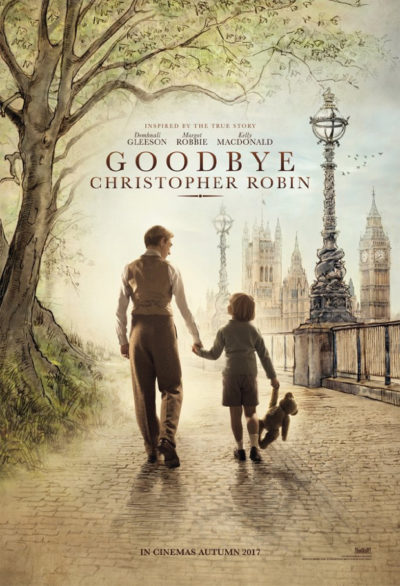After a couple months of deliberation, my husband and I decided to try a MoviePass membership. The expense of seeing movies keeps us from going to many, but since this service would allow us to pay only $10 a month for up to one movie every day, it seemed worthwhile. It also removes the fear of “What if we try a movie and it’s no good and we wasted thirteen bucks?”
So the first film upon which we used our new passes was Goodbye Christopher Robin.
I had been seeing trailers for awhile, and was excited to check out the actual story itself. I’ve always loved Winnie-the-Pooh, as well as some of A. A. Milne’s other works; plus it’s always interesting to see stories about writers.
In the end, we both really enjoyed the movie. I thought the filmmakers did the best job they could have with it. So why has it not received much critical acclaim?
Probably because people went in with the wrong expectations.
The previews made this look like a cute-and-cuddly, feel-good drama about a man who writes lovable stories for his adorably dimpled son. Reality was harsher. A. A. Milne was a troubled man with an even more troubled wife. His stories, while well-intentioned and well-beloved, wreaked havoc on the life of his son. The real Christopher Robin, it seems, was scarred by fame that he had never asked for and was much too young to bear.
It was an interesting tale. And it demonstrated something I noticed a very long time ago about writers.
They don’t have easy lives.
I remember reading biographies of Dickens, C. S. Lewis, L. M. Montgomery, Louisa May Alcott–all my favorite authors, all those whose work I regarded as the best of the best. And I remember noticing that all of them were beset by trouble almost constantly. Bad health. Bad relationships. Troubled families. Experiences of war. Unhappy marriages. Traumatic childhoods.
I wondered, is it necessary for a good author to lead a troubled life?
Goodbye Christopher Robin was yet another piece of data pushing me further into this conclusion. Even the happiest, most lighthearted stories, such as Winnie-the-Pooh, are not what they seem. A. A. Milne’s classic children’s books were brought to us at a high price–the price of a war-haunted man and a disappointed son.
So then, I wonder, can a person not be a good writer if that person has not had a hard life?
I resisted the idea for a long time, longing for writing prowess but noting that my own life was free from the kind of tragedy I observed in others. But then, as I grew older, I noticed something.
Everyone has a hard life.
Not everyone has been to war, it is true. Not everyone experiences what we might call external tragedy. But everyone has their demons. If not outside, we have them inside. They can take the form of cancer, but they can also take the form of depression. They can take the form of divorce, or they can take the form of a struggle to be accepted for who we are. They can be true demons, in the traditional, spiritual sense, seeking to lead us away from the Truth that will give us peace.
It’s one of the most poignant promises in history. “In this world, you will have trouble.” No qualifiers. No exceptions. The Savior of the world, of our souls, tells us frankly. In the world, the one He came to save, we will most assuredly have trouble. Every one of us.
That includes Dickens. And it includes A. A. Milne. And it includes me.
So can only people who have hard lives be writers? I believe so. Because the greatest of writers write with vulnerability, out of their own heartaches and joys and pains and despair. Out of their own journey. And that journey will always include pain.
Perhaps this means there is a writer hiding in all of us. Some of us put the words on pages, but some of us just live them, day by day, contributing to our stories and the stories of others in ways we can only begin to imagine.
Perhaps our greatest achievements only come when we look to the most innocent part of ourselves, the part that has not faced up to trouble and hardship, and bid a fond goodbye.
Perhaps in that moment we all leave childhood behind.
And perhaps writer is only another word for grown-up.

I’m excited to see this movie sometime. So glad you shared your thoughts after watching it. I love what you wrote on writers. We all have a story to tell.
I hope you enjoy it when you see it! Like I said, it’s not a “feel good” story but it’s very interesting and I really did enjoy it.
Thanks for sharing your thoughts. I agree. We all have hard things in our lives. One of the short stories I wrote talks about the broken places we all have. I think we tend to see ourselves as the only people who deal with “this much pain” when in fact none of us live perfectly happy lives.
Thank you! Yes, I love the verse that points out that “every heart knows its own pain.” Our pain may look different than someone else’s, but that doesn’t mean it’s either more or less. The greatest pain you’ll ever feel is your own.